Protective gloves
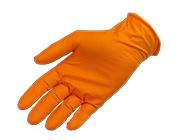
Bodywork protection gloves
-
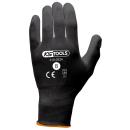 310.0324Black microfibre glovesSize 8 - Box of 12 pairs
310.0324Black microfibre glovesSize 8 - Box of 12 pairs -
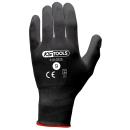 310.0325Black microfibre glovesSize 9 - Box of 12 pairs
310.0325Black microfibre glovesSize 9 - Box of 12 pairs -
 310.0330Black microfibre glovesSize 10- Box of 12 pairs
310.0330Black microfibre glovesSize 10- Box of 12 pairs -
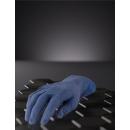 6745.0001Powder-free latex glovesBlue - size M
6745.0001Powder-free latex glovesBlue - size M -
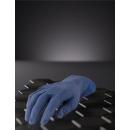 6745.0002Powder-free latex glovesBlue - size L
6745.0002Powder-free latex glovesBlue - size L -
 6745.0003Powder-free latex glovesBlue - size XL
6745.0003Powder-free latex glovesBlue - size XL -
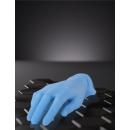 6760.0001Powder-free nitrile glovesBlue - size M
6760.0001Powder-free nitrile glovesBlue - size M -
 6760.0002Powder-free nitrile glovesBlue - size L
6760.0002Powder-free nitrile glovesBlue - size L -
 6760.0003Powder-free nitrile glovesBlue - size XL
6760.0003Powder-free nitrile glovesBlue - size XL -
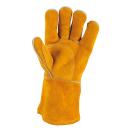 985.7035Short protective glovesfor welders - L
985.7035Short protective glovesfor welders - L -
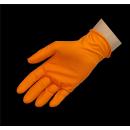 Gantspremium LPowder-free nitrile glovesPremium - L - box of 50
Gantspremium LPowder-free nitrile glovesPremium - L - box of 50 -
 Gantspremium MPowder-free nitrile glovesPremium- M- box of 50
Gantspremium MPowder-free nitrile glovesPremium- M- box of 50 -
 Gantspremium XLPowder-free nitrile glovesPremium- XL - box of 50
Gantspremium XLPowder-free nitrile glovesPremium- XL - box of 50
︾
The benefits of professional safety gloves in the bodywork industry :
Protective gloves play an essential role in the bodywork industry, providing a physical barrier between workers' hands and the various hazards present in a workshop. Here are some important aspects to consider when it comes to protective gloves in bodywork:
1. Materials of construction :
Body shop gloves are often made from materials such as leather, neoprene, latex, nitrile or vinyl. The choice of material depends on the specific tasks performed and the types of chemicals encountered.
2. Protection against chemicals :
In a body shop, workers may be exposed to chemicals such as solvents, primers and paints. Protective gloves must offer adequate chemical resistance to prevent skin reactions and protect against potential chemical hazards.
3. Cut and puncture resistance :
Glove materials must also offer some resistance to cuts and punctures, as workers may come into contact with sharp edges, tools and abrasive materials.
4. Comfort and fit :
Comfortable, well-fitting gloves are essential to allow optimum dexterity while providing the necessary protection. Some gloves have features such as adjustable cuffs for a secure fit.
5. Tactile sensitivity :
Some bodywork jobs require a high degree of tactile sensitivity. Protective gloves that offer sufficient dexterity enable workers to handle parts, use tools and carry out delicate tasks.
6. Disposable versus reusable gloves:
Depending on their needs, workers can opt for disposable gloves for one-off tasks or reusable gloves for longer jobs. Disposable gloves are practical for avoiding cross-contamination.
7. Non-slip gloves:
Some gloves have non-slip surfaces, which are particularly useful for maintaining a secure grip on tools and workpieces, even in the presence of liquids such as water, oil or paint.
8. Heat resistance:
For work involving welding processes or other sources of heat, heat-resistant gloves are required to protect hands from potential burns.
9. Safety standards:
It is important to choose gloves that comply with current safety standards. Some sectors may have specific regulations regarding personal protective equipment, including gloves.
10. Ease of cleaning:
Some bodyshop gloves need to be cleaned frequently to avoid build-up of chemicals or residues. Ease of cleaning can be an important criterion, especially for reusable gloves.
The choice of protective bodywork gloves depends on the specific tasks performed, the chemicals handled and individual preferences in terms of comfort and functionality. By choosing the right gloves for each situation, workers can ensure effective protection of their hands in the demanding environment of a body shop.
Our different types of professional safety gloves:
Body shop protective gloves come in a variety of types, each designed to meet specific safety and comfort needs. Here is a brief description of some of the types of gloves commonly used in the body shop:
1. Microfibre safety gloves :
Microfibre gloves are often used for specific tasks, such as polishing and buffing. They are soft, lightweight and offer excellent absorption, making them suitable for work where delicacy and precision are required.
2. Powder-free latex safety gloves:
Latex gloves are elastic, offering a good fit and great dexterity. They are commonly used in the automotive industry for general tasks, but it is important to note that some people may be allergic to latex.
3. Powder-free nitrile safety gloves:
Nitrile gloves are an alternative to latex gloves, ideal for those who are sensitive to latex. They offer excellent chemical and puncture resistance, making them suitable for chemical handling tasks in the body shop.
4. Short protective safety gloves :
Some jobs require short protective gloves, often called cuffs. These gloves offer wrist and forearm protection, but do not cover the whole hand. They are practical for specific tasks where extended protection is not required.
Each of these types of glove has its own advantages and is adapted to specific bodywork applications. The choice of glove type depends on the tasks to be carried out, individual preferences and the safety standards in force in the workshop. Factors such as chemical resistance, dexterity, comfort and durability are essential when choosing the right protective gloves.
Your questions on the use of professional bodywork safety gloves :
In the world of car bodywork, the questions asked about professional safety gloves often reflect the concerns of workers and enthusiasts concerned about protecting their hands in a demanding environment. Here are some of the most frequently asked questions:
1. What are the best safety gloves for bodywork?
Users are often looking for recommendations on glove brands and models that offer optimum protection while providing the necessary comfort and dexterity.
2. What glove materials are recommended for bodywork?
This question explores material options, such as nitrile, latex, leather, and others, to determine the most suitable choice for specific bodyshop tasks.
3. Are nitrile gloves better than latex gloves for bodywork?
Users are looking for comparative information between nitrile and latex gloves, taking into account factors such as chemical resistance and potential allergies.
4. How do I choose the right size of bodywork safety glove?
The question of the right size is frequently asked, as a precise fit is essential to ensure safety and comfort when working in the bodywork.
5. What safety gloves are recommended for bodywork painting?
Users are looking for gloves specifically adapted to paint stains, often requiring particular resistance to chemicals and protection against splashes.
6. Should safety gloves be disposable or reusable in the body shop?
This question explores the difference between disposable and reusable gloves, taking into account practicality and hygiene in a bodywork environment.
7. How do I care for and clean bodywork safety gloves?
Users are looking for advice on how to care for gloves to extend their life and prevent the build-up of contaminants.
8. Do bodyshop safety gloves need to be heat resistant?
This question looks at the need for heat resistance in gloves, particularly for tasks such as welding or working near heat sources.
9. Can safety gloves be worn with other personal protective equipment?
Users are asking about the compatibility of gloves with other protective equipment, such as goggles, helmets and protective suits.
These questions reflect users' concern to choose appropriate safety gloves that are adapted to their specific bodywork needs, while complying with the necessary safety and comfort standards.